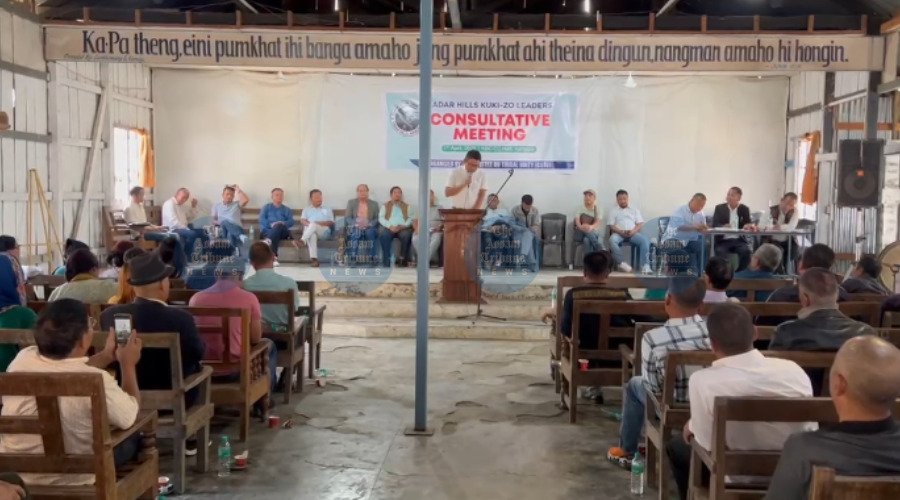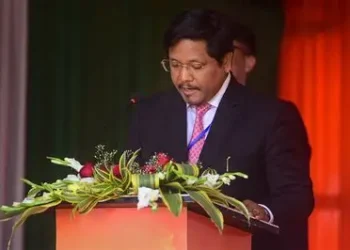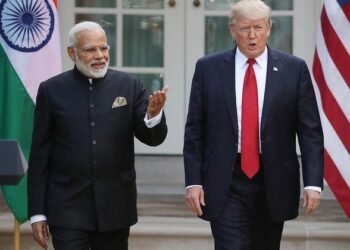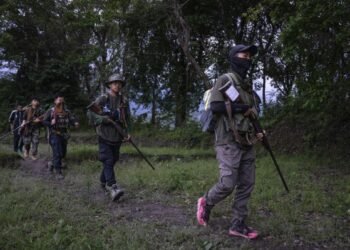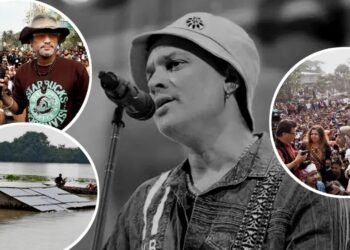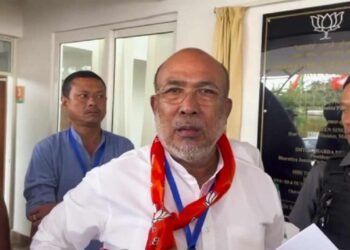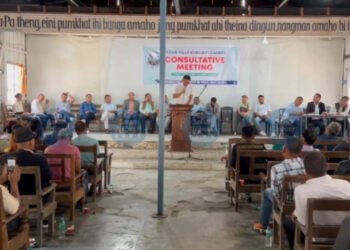Beyond Manipur, the conclave should build alliances, foster inter-community dialogue, and ensure national visibility for the Kuki-Zo struggle.
BY Navin Upadhyay
October 9, 2025: As top leaders of the Kuki-Zo community prepare to gather in Shillong on October 10–11, the stakes could not be higher. Representatives from civil society groups, armed organisations under the Suspension of Operation (SoO) pact, elected MLAs, and influential opinion-makers will convene to chart the future of a community that has long faced political fragmentation, ethnic strife, and neglect. The two-day conclave must go beyond symbolism and focus on a concrete, unified strategy for the tribal community in Manipur.
To achieve meaningful progress, the conclave must first address the internal cohesion and political representation of the Kuki-Zo community. Fragmented leadership has often weakened the community’s voice at both state and national levels, with competing factions, civic bodies, and militias issuing contradictory statements. Establishing a unified political coordination council, incorporating civil, church, student, and political leaders, is essential.
This council would ensure that the community speaks with one voice on governance, negotiations with the Centre, and hill district autonomy, while also holding the central and state governments accountable for past assurances, including the tripartite agreement on free movement along NH-2 and the renewal of the SoO pact.
Equally important is a focus on humanitarian, constitutional, and reconciliation priorities. Thousands of Kuki-Zo families remain displaced in relief camps with inadequate housing, healthcare, and education. Coordinated rehabilitation and reconstruction efforts are critical, alongside pursuing constitutional safeguards for administrative autonomy and resource control.
READ: Manipur: Kuki Militant Group Asks Kuki-Zo MLAs to Quit Assembly
The conclave must also take steps to rebuild moral authority and inter-community trust, addressing factionalism among armed groups, ending extortion, and promoting dialogue with neighboring communities to foster coexistence. Strategic outreach beyond Manipur, including alliances with other tribal groups and political parties nationally, symbolic protests in Delhi, and support for community members facing legal challenges, must also feature on the agenda to elevate the Kuki-Zo struggle to the national stage.
With these priorities clearly outlined, the Shillong conclave can move from discussion to decisive action, ensuring the Kuki-Zo community consolidates its political power, safeguards its people, and secures a sustainable and respected place in the political and social landscape of Manipur and beyond.
READ: Shocking Twist in Zubeen Garg Death: DSP Arrested
Some key points that must be discussed, in the larger interest of the tribal community’s goals and aspirations, are as follows:”
- Forge Unified Political Representation
The Kuki-Zo voice has historically been fractured, weakening its influence in state and national politics. Conflicting statements from rival factions, militias, and civic bodies often dilute their demands. The Shillong conference must prioritize the creation of a single political coordination council, comprising civil, church, student, and political leaders. Only a unified platform can ensure coherent representation in negotiations with the Centre and hill district administrations, amplifying the community’s bargaining power. - Hold the Centre Accountable on Previous Assurances
The meeting must review the Centre’s inaction on last month’s tripartite agreement with the Ministry of Home Affairs, the Kuki National Organisation (KNO), the United People’s Front (UPF), and the Kuki-Zo Council (KZC). The agreement promised free movement along NH-2 and a renewed SoO pact, along with dialogue on political demands—interpreted by Kuki-Zo leaders as a push for Union Territory status. A month has passed without substantive progress, and the conclave must decide how to press the Centre for tangible outcomes. - Define Strategy in the Face of Political Shifts
More than two dozen BJP MLAs lobbying in New Delhi to restore an elected government in Manipur, the conclave must deliberate on a clear stance for Kuki-Zo legislators. Any change in the state’s governance structure could affect ongoing negotiations and the community’s political leverage, making consensus essential. - Rehabilitation and Resettlement for Displaced Families
Thousands of Kuki-Zo families remain displaced, living in relief camps with inadequate access to housing, education, and healthcare. A coordinated rehabilitation framework must be developed in partnership with humanitarian agencies and the Centre to ensure safe resettlement, fair compensation, and restoration of services in Kangpokpi, Churachandpur, Tengnoupal, and other affected areas. - Pursue Constitutional Safeguards and Administrative Clarity
The demand for “separate administration” remains unresolved. The conclave should outline a structured negotiation strategy with New Delhi to secure legal protections and administrative autonomy, whether through the Sixth Schedule or alternative constitutional mechanisms. Clarity on governance, resource control, and security is non-negotiable for long-term stability. - Establish Moral Authority and End Factionalism
The proliferation of armed groups claiming to defend Kuki interests has blurred lines between political and militant activism, inviting state retaliation and eroding public trust. Leaders must crack down on extortion, prevent factional clashes, and explore alternative livelihoods for affected populations. Restoring moral credibility is crucial for national and international support. - Promote Inter-Community Dialogue and Reconciliation
Ethnic tensions with neighboring Naga communities continue to pose a generational risk. The conclave should prioritize grassroots reconciliation platforms, engaging church leaders, youth, and women’s groups to discuss coexistence, shared economic recovery, and safety. A long-term vision of shared prosperity will ensure the Kuki-Zo community’s security and legitimacy. - Expand Political Horizons and National Visibility
The Shillong meeting should explore building alliances with tribal groups and political parties across India, forming sub-groups for strategic discussions, staging symbolic protests at Rajghat, and leveraging crowdfunding to support incarcerated members or legal battles. In addition, the conclave must address perceived discrimination by central probe agencies, ensuring the community’s grievances receive national attention.
The upcoming conclave is more than a gathering; it is a defining moment for the Kuki-Zo community. By focusing on unity, accountability, rehabilitation, and strategic outreach, the leaders can transform frustration into a coordinated effort that safeguards their people’s rights, dignity, and future.


